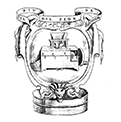Informazioni
- Datazione: -1998
- Note biografiche: The death of Giovanni Cecchetti, which took place in Los Angeles on December 5, 1998, at the age of 76, not only marked an affective loss in the circle of his family and friends, but it also left a vast empty space within the community of scholars in the field of Italian Studies and germane disciplines. Giovanni had undoubtedly been one of the pioneers of Italian culture in the United States - he liked to define himself a “missionario culturale.” It remains clear that his had been a work in the trenches, an effort that rested on the foundation of a solid academic knowledge on one hand, and on the other was characterized by his very personal verve of passionate and charismatic teacher. An emeritus for a few years, Giovanni kept going to his office on the UCLA campus punctually every day; he kept lecturing as well, upon invitation, not only in California, but also in other states and countries. His publications of essays on literary criticism, poetry, and translations, rather than diminishing, had actually increased in the last few years.
Cecchetti must also be remembered for his extraordinary ability as an administrator, an organizer, for his capability especially to establish new programs in Italian Studies and restructure old ones in various parts of the United States – from Berkeley to Tulane, then again in California, Stanford first, and finally UCLA. Giovanni remained all of his life faithful to his “cultural mission.” As if all of this activity was not enough, he made sure to participate on a national scale to all those activities that determine the success of the various professional cultural organizations of the Italian community. It would be very difficult to find someone in this context that was not touched by what we might call the cecchettiana presence, a presence characterized by generosity, altruism and an innate, ever present, sense of humor.
Side by side to a purely academic activity, next to interpretative and theoretical writings and the translation into English of difficult Italian authors such as Leopardi and Verga, Giovanni has left us a legacy of an exemplary creative mind. This in the form of smoothly flowing prose rich in fantastic imagination, in existential situations that are often paradoxical, but never fall into banality. But above all, he left us a terse and luminous poetical language through which he was able to transcend the personal experience and attain truths that reveal themselves to any reader willing to recognize his/her own self.
